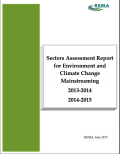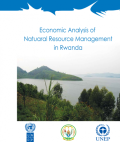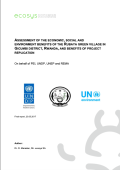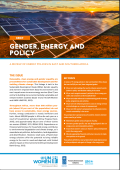
An assessment of Integration and Implementation of Environment and Climate Change Activities into Development Sectors Plans and Programmes in Rwanda conducted by the Rwanda Environment Management Authority (REMA) through the Department of Environmental Education and Mainstreaming (DEEM) with the support of the Poverty-Environment Initiative (PEI).

This economic analysis report is structured around two arguments. Firstly, natural resources and ecosystem services in particular have significant contribution to economic growth and poverty reduction. Secondly, failure to manage natural resources, conserve and protect the ecosystem will result in costs of degradation that will compromise medium and long term sustainable development. An ecosystem services approach has been used which is capable of capturing aspects of the environment and natural resources that are usually neglected either because they do not have market values or they cannot readily be quantified. The approach is supported by Case Studies of Rugezi Wetlands and Gishwati Forest.

The objective of the present assessment is to determine to what extent the Rubaya green village demonstration project has been successful in raising the well-being of the beneficiaries while, at the same time, ensuring the sustainable use of natural resources and social cohesion. The project efficiency was determined to be high, leading to benefits surpassing the costs by 15% to 35%. The potential net benefits to Rwanda, the report found, justify the replication of the Rubaya green village demonstration project and to make the case for the Government and development partners to invest in the widespread replication of the project.

This review of 15 energy policies in East and Southern Africa shows that over half (60 percent) have integrated gender. This brief follows up on the recommendation made by the working paper by conducting an initial review of gender integration in energy policies in East and Southern Africa. To this end, it reports on the results of an analysis of national energy policies and strategies in the region.
This report covers the current status of women’s participation in the energy sector - using case studies from Mexico and Rwanda, to help inform future labour projection models and the assessment of co-benefits.
